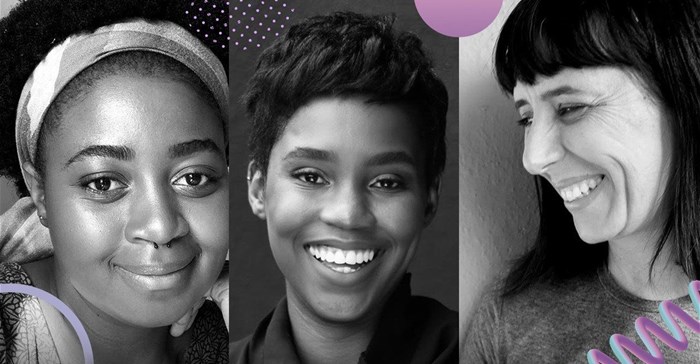






TransUnion conducted research in May that revealed 14% of South Africans have lost their jobs and 37% have experienced a reduction in hours (with a subsequent reduction in remuneration). In its report on the side hustle economy, the Henley Business School showed that as many as 27% of working South Africans currently have side hustles.
It’s within this context that SheSays Cape Town – the local chapter of a global network of women in creative industries – hosted its recent Zoom event, moderated by co-director of SheSays Cape Town, Anelde Greeff. The panel included Nkgabiseng Motau, co-founder and chief creative officer of creative agency Think Creative Africa; Joanne Hope, general manager of John Brown Media and founder of KushKush (a female-centric cannabis-centred retail and content platform) and Sinenhlanhla Ndlela, founder of artisanal dairy-free ice-cream brand Yococo.
Along with the uncertainty Covid-19 presents, the panellists agreed that there's also a lot of opportunity to either leapfrog ahead in your career or make a complete change. People are applying a 'hustler' mentality in order to make changes in their current jobs or to start something of their own.
“Now, more than ever, businesses need people that are willing to learn and are willing to explore different ways of doing things, because businesses that don’t do that won’t survive,” said Joanne Hope. “Even if you’re not ready to make that change to work for yourself or build your own little side hustle ‘empire’, you can make a big difference within the business that you find yourself.”
Here are 7 key takeouts from the event:
“For those in the advertising industry, there’s a unique opportunity: the main discipline we practice is problem-solving. What’s wrong with the current agency model? What can be innovated or disrupted? What are clients looking for? What’s missing, in terms of even a demographic? We do this thinking on a daily basis on behalf of clients.
“I would challenge anyone who is looking to feel more comfortable or looking for something else in their career to look around and ask, ‘what is it I like?’ and ‘what is it I’m good at?’. Probably at that intersection, there’ll be a few problems or gaps that haven’t been filled. And those ideas are probably the best because you like the thing, you’re really good at it, and other people are not looking at it the way you are. If you can offer a solution for that, there’s so much longevity because you’ll be able to motivate yourself towards it.” – Nkgabiseng Motau
“Don’t quit your main hustle before your side hustle forces you to. Do your research before you jump in. You might never need to quit your job – this could be a creative outlet that keeps you feeling well-rounded and excited about life in general.
“So many people sit around with these wonderful ideas and they feel like they have to have it all figured out before they start doing anything. If there’s a relatively low-risk way of starting, then just do it. Do something small every day to move yourself forward: pretty soon you’re going to start seeing some momentum, even if it’s just figuring out whether this is something you really want to do. But thinking about it isn’t going to get you any further forward towards that decision. Just do it!” – Joanne Hope
“Start bit by bit. Don’t start your business at the end, with your big dream of what it should ideally be like, because then you'll think you’re going to need so much money. Not all businesses need capital to start, but rather to grow. Assess your needs: can you start small and build from there rather than rushing the end product?” – Sine Ndlela
“From a self-esteem perspective, there’s a lot tied into ‘what I do’ versus ‘who I am’. The process of accepting the fact that it’s very likely that you will fail at something at some point is really important. If you want to start a side hustle or really make a go of your own business, you have to confront the fact that it could happen and if it does, what are you doing to do?
“One of the exercises that I still do today is think: what is the absolute worst thing that can happen? Solve that problem.” – Joanne Hope
“If there’s a way to not rely on external capital, you should do that. Try a test case and see if it will work. If you do need investment to get something meaningful off the ground, choose a financial partnership, whether it’s a financial institution or someone offering seed funding, in a similar way to choosing a business partnership. Essentially, you’re answerable to those people and it adds a lot of pressure when you’re building a business with people who aren’t on the same page as you.” – Joanne Hope
“It’s important to know that you can’t do everything yourself. I struggle to ask for help until I’m drowning. There’s no way you can succeed alone, without delegating and actually trusting people. I try to keep the work environment very zen, so that when we’re stressed, it’s not because of our own stuff, it’s things that we actually have in front of us that we can fix. Teamwork really does make the dream work.” – Sine Ndlela
“It’s a tough lesson to learn when you founded the business doing everything yourself, and you then bring others in to do the tasks you once did. (It's tough) not to micromanage them or expect them to do the tasks exactly as you would approach them. Rather allow people the space to bring a different value to the business – getting what you need done, but slightly differently.” – Nkgabiseng Motau
“Business needs discipline. [There’s this] fancy idea of entrepreneurship that we can thank Silicon Valley for, which I have found doesn’t exist. You need to be disciplined. You need to have grit. It’s not a glamorous game. It’s literally busy-ness. What are you going to be busy doing every single day? If you love that thing, it’s not going to be hard, but realistically, it’s going to be a lot of hard work.” – Nkgabiseng Motau
“Take a break rather than quit. With a break in perspective, you come back feeling like the issue that was once a mountain is now a molehill. I didn’t take naturally to breaks because I felt that meant I was slacking, but [I’ve learnt] I come back and look at the problem with new eyes. I can typically solve it so much sooner with a lot more energy.”
“In personal crises you do need someone with a different perspective and theoretical knowledge to help you through that scenario, especially if you’re an entrepreneur and a leader in an organisation. Many entrepreneurs are in groups with other entrepreneurs to discuss issues that they face in business and their personal lives, and many others are in therapy. Using professional tools when you feel like you can no longer just solve a problem with rest is invaluable and nothing to be ashamed of.” – Nkgabiseng Motau
Follow She Says Cape Town on Instagram, Twitter and LinkedIn and sign up to their newsletter here to stay up to date with news and events.
